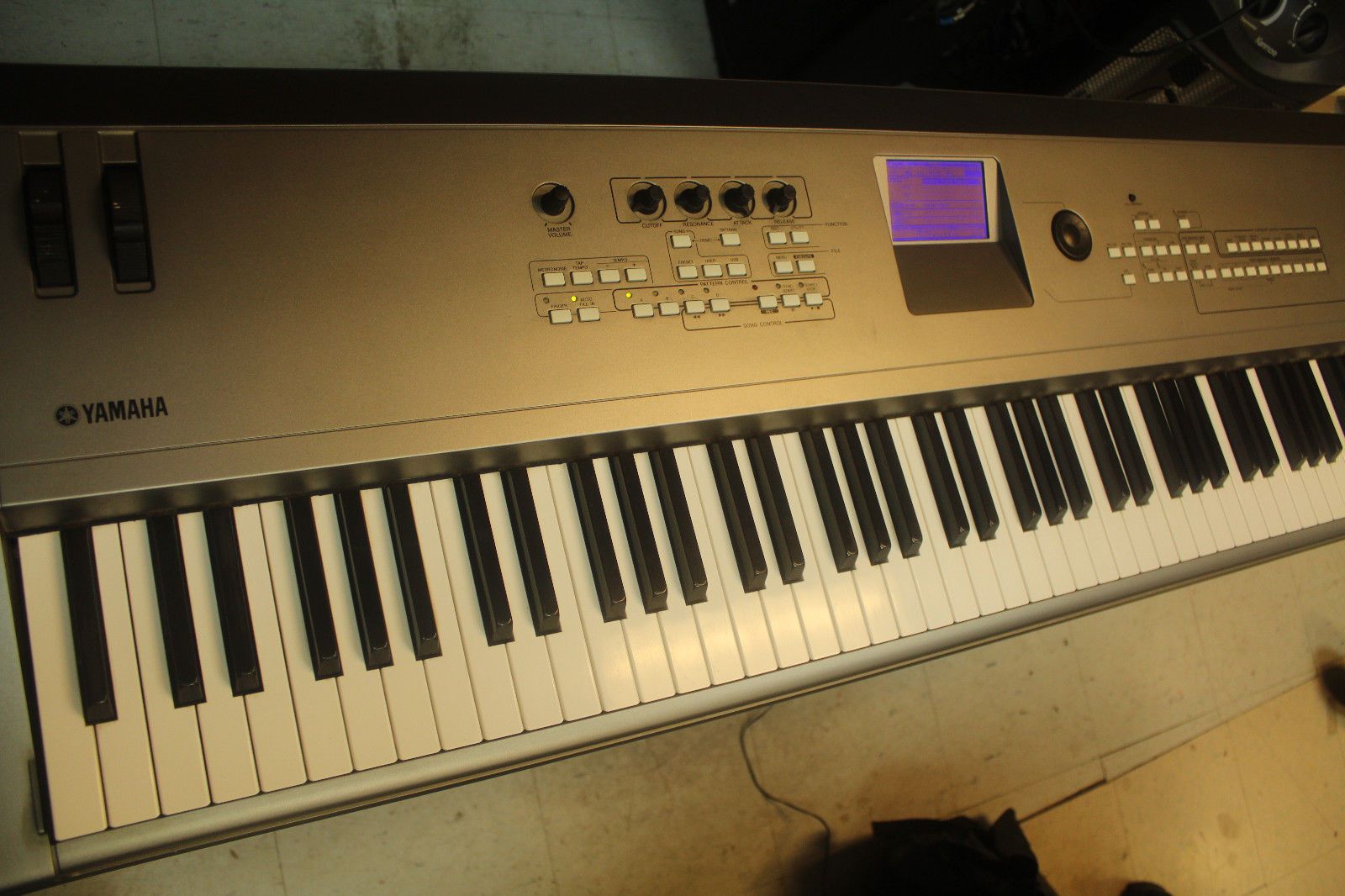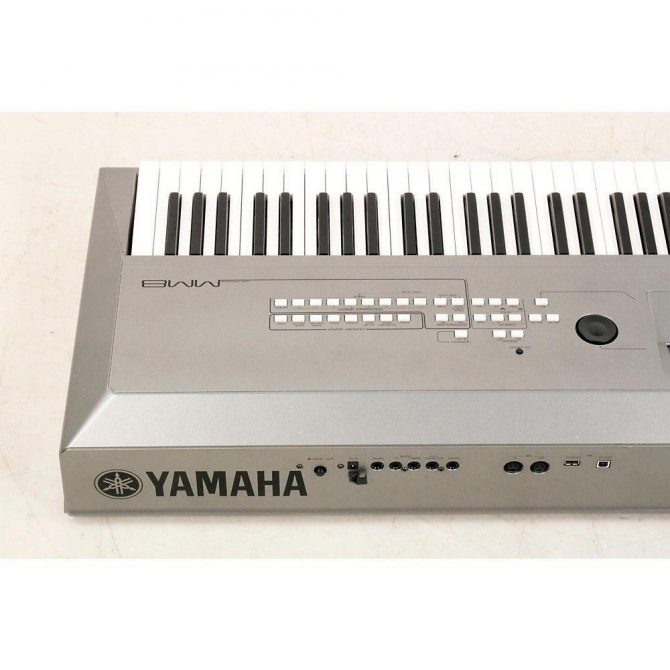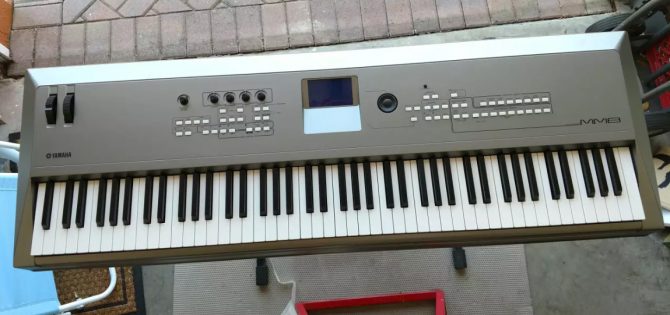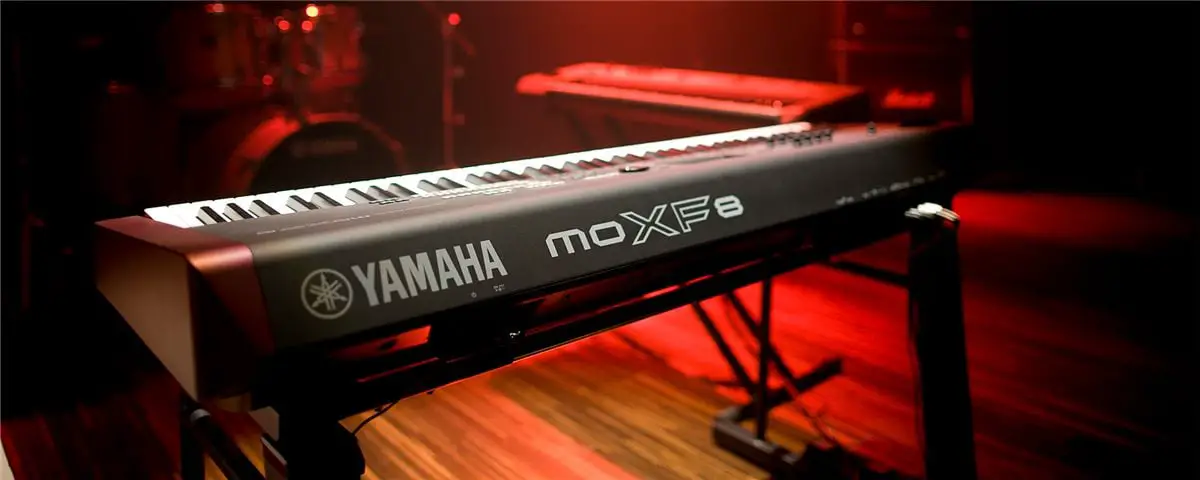
Please click image for more info
One of the most popular, the Yamaha MM8 keyboard has a good reason. Some of you may wonder what the MM eight stands for. It actually stands for mini motif, a representation of the motif keyboard created by Yamaha.
One of the contrasting differences between the motif and the MM8 is that the sound libraries are borrowed from the PSR line of keyboards. Hence, the Yamaha MM8 is somewhat of a hybrid.
In this Yamaha MM8 review, we will take a look at different features and working of this keyboard.
Table Of Contents Yamaha MM8 Video OverviewFull Length Graduated Hammer KeyboardA Multitude of Ports for Easy Importing and ExportingFeaturing the Powered Up Power Grand PianoKeyboardControlsSound QualityInterfaceBuildPerformance MemoryArpeggiatorYamaha MM8 Demo with Tony EscuetaAlternative Products to ConsiderProficiency Music’s Yamaha MM8 Keyboard ReviewConclusion
Yamaha MM8 Video Overview
Video Overview of Yamaha MM8 Keyboard Synthesizer by UniqueSquared.
Full Length Graduated Hammer Keyboard

One notable feature is that the keyboard itself is actually an 88 note piano with graduated hammer action and is considerably larger than previous models.
If we look at the top console layout of the keyboard it would appear to be somewhat sparse but that is just because of the size of the keyboard. Yet there are a lot of features built-in including an array of buttons to keep you happy.
A Multitude of Ports for Easy Importing and Exporting

The ports on the rear panel are quite simple with MIDI, audio, pedal sockets and two USB ports, one for connecting to a PC and the other for storing setup data.
There is also a headphone jack that is included but it is not very well-placed because it can snag on keys, sheet music and other things as well.
The pitch and modulation wheel are positioned right at the top left hand corner.
This keyboard is somewhat light to carry even though it features graded hammer action keys. Certainly the Yamaha MM8 is well-suited for band performance, however if you are considering using his kennel is a full-fledged recording studio on its own then you might want to consider another keyboard for that purpose or hook it up to a computer equipped with MIDI software.
Featuring the Powered Up Power Grand Piano

On power up the Yamaha MM8 defaults to an somewhat punctuated acoustic grand piano rather than the standard acoustic piano. Yamaha refers to this as the power grand, a sound that is very present and upfront.
While it is a great sound it isn’t all that great for creating solos in his more well adapted to background playing. I would suggest using some of the other internal piano sounds. The MM8 features the ability to split or layer the keyboard in the same manner as many other keyboards, so nothing new there.
Wanting to certainly note which came as somewhat of a surprise is the fact that the keyboard only supports 32 notes of polyphony. That is a big surprise given the price for this keyboard. Maybe keyboards in this price range usually sport 64 notes of polyphony.
Keyboard
When it comes to keyboard inspection, one of the first things that people check is the keys. The Yamaha MM8 has 88 fully-weighted keys with great feel and texture. Many digital piano manufacturers’ goal is to create a keybed that looks, feels, and plays like an acoustic piano. In this department, the MM8 doesn’t disappoint. Given that the keyboard is a synthesizer, the weighted keys are an excellent addition because many synths have smaller non-weighted keys. Along with being weighted, the keyboard has graded keys, requiring varying amounts of force to push them down. Acoustic pianos have a natural grade due to their internal physics, which causes the lower keys to be slightly harder to push down. Digital keyboards with this added function are highly-valued among pianists because they simulate a real piano experience. Since the MM8 is a synth with genuine piano characteristics, users can employ pianistic techniques on a synthesizer.
Controls
The Yamaha MM8 features controls to customize and manage sounds, filters, attacks, and releases. These controls are easy to manipulate on the keyboard, so you likely won’t need to do much research on them. A MIDI function allows you to connect the keyboard to a Digital Audio Workstation on your computer. Utilizing this connection opens up a world of possibilities at your fingertips. DAWs are prime for creating and producing professional-standard music. On top of MIDI controls, the MM8 has a regular pitch bender and mod wheel, which can aid expressiveness. Unlike a natural piano, instruments like the saxophone and guitar can bend notes. Pitch bend wheels allow pianists to enter the realm of these other instruments.
Sound Quality
This keyboard produces an impressive array of sounds. With 418 different sounds, you’ll likely find enjoyment through lots of experimenting. Keyboards with a similar price tag may only feature 20 sounds to create a higher quality of tones. Though these pianos may provide slightly better sounds, keyboards like the MM8, with 418 different options, have a broader potential for entertainment. In addition to the gallery of tones, the MM8 features 22 drum kits, which also widen the range of musical possibilities. Even with the keyboard’s plethora of sounds, there are still some drawbacks. For example, the MM8 has just a 32-note polyphony, meaning that only 32 notes can play simultaneously. This limiting number isn’t a problem for casual players because it’s impossible to play that many notes with your fingers. This low polyphony becomes a problem for those wishing to layer and create highly-textured sounds. Without having at least a 120-note polyphony, you can’t customize vastly complex sounds. This keyboard is excellent for people who value the experience of playing more than sound designing. One of the keyboard’s standout tones is the guitar emulator. People who’ve used synth guitar patches in the past may know that they’re generally mediocre-sounding at best. However, the MM8’s guitar emulator produces a crisp and authentic guitar sound that may surprise many musicians. The keyboard’s engine strives to recreate the strumming actions that a guitarist executes while playing.
Interface
Another robust feature of the MM8 is its easy-to-use interface. Finding a synth board with a user-friendly interface can be challenging because many are laborious to navigate. Each of the 418 tones fit into categories like Piano, Guitar, Organ, Drums, etc. These subgroups allow easy access to specific sounds, preventing you from having to scroll through one giant gallery. Though this idea is simple, it’s effective and not found in every synth board.
Build
The Yamaha MM8 has a standard build quality for keyboards in its price range. At 34.4 lbs, the piano is relatively lightweight and portable. If you have performances or gigs, you likely won’t want an overly heavy keyboard, hence why the MM8 may work well. Included on the synth is a 320×240 graphic LCD, which offers some navigational advantages. Clear and functioning screens are an essential aspect of most high-class digital pianos. A few additional built-in features include a line out jack, headphone jack, and a MIDI in and out jack.
Performance Memory
With a substantial performance memory, the Yamaha M88 allows you to switch between sound sets instantly, even in the middle of playing. You can save your own unique settings such as sound presets, keyboard layouts, effects, drum patterns, and more. The keyboard can also save up to 64 performances, which is significant compared with other synths on the market. Additionally, you can save up to five entire songs to the device. This feature allows you to upload files directly to a DAW, which is crucial in modern standards.
Arpeggiator
The MM8’s arpeggiator is arguably one of the most significant features that the workstation offers. With a remarkable 213 separate rhythmic arpeggios to choose from, the MM8 surpasses most of the competition. Many drum loops and bass patterns serve to provide accompaniment, aiding the creative process. You can even load the keyboard’s stellar guitar emulator into the arpeggiator to create ultra-realistic guitar sounds that are miles ahead of other synths.
| The Good |
|---|
| If you’re looking for a keyboard that has great sound for performances but you’re not concerned about using it as a composer/arranger keyboard than this might be the right keyboard for you. |
| The Bad |
|---|
| This keyboard is not well adapted for composers and music arrangers. |
Yamaha MM8 Demo with Tony Escueta
Alternative Products to Consider
Yamaha MOXF8
The Yamaha MOXF8 represents a high-class of Yamaha keyboard production. This piano utilizes the Motif sound bank to create a copious amount of excellent sounds. One major advantage that the MOXF8 has over the MM8 is its 128-note polyphony. With the polyphonic advantage, the MOXF8 can layer, and design sounds significantly more than the MM8.

The keyboard’s effects suites are also a slight advantage and give you additional editing tools. With a steep price of $2,000, the MOXF8 is definitely a big step up in price. If you’re looking for an excellent quality piano with great value, the MM8 will probably serve you fine. But, if you have the extra money and fancy access to some legendary sounds, the MOXF8 might be worth checking out.
Korg M50
The Korg M50 is an entry-level professional workstation. This keyboard is an excellent alternative to the MM8 because of its renowned M3 Workstations Library and 128-note polyphony. With some of Korg’s best-released sounds to date, the M50 is a fantastic digital piano. In general, the M50 very suitable for studio work and home use, while the MM8 excels in performance situations.
Proficiency Music’s Yamaha MM8 Keyboard Review
Conclusion
The Yamaha MM8 is an all-around superb keyboard. There are some top-tier sounds in the MM8’s soundbank, from ultra-realistic guitars to warm and luscious strings and pads. One of the most impressive aspects of this keyboard is the expansive arpeggiator, which offers over 200 presets. Though the workstation only presents a 32-note polyphony, it serves the functions that Yamaha intends, producing top-of-the-line sounds at an affordable price. With 88 fully-weighted keys, the synth feels much more like a real piano than many others on the market. Yamaha’s affordable MM8 package delivers all the central features you’d expect in a powerful workstation. If you’re a gigging musician, you may enjoy this keyboard because of its lightweight nature. Lighter keyboards like the MM8 are far more suitable for performances than bulky pianos. If you’re looking for a digital keyboard that showcases stellar sound quality, reliability, and portability, you may find that the Yamaha MM8 is the right instrument for you.
We hope that you enjoyed Yamaha MM8 review and it will help you in deciding if this keyboard is the right choice for you.

